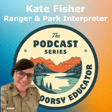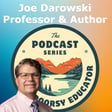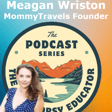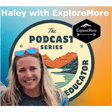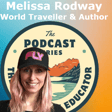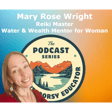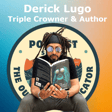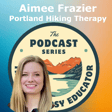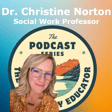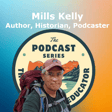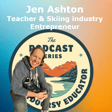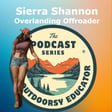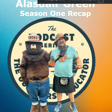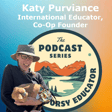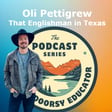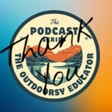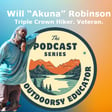Become a Creator today!Start creating today - Share your story with the world!
Start for free
00:00:00
00:00:01

Muriel MacKenzie
Join Alasdair and Muriel for their first conversation in 25 years! Muriel shares her vast knowledge of life in Lewis, the importance of different travel experiences, and how to help our students feel valued and change the entire course of their lives.
Recommended
Transcript
Introduction and Dedication
00:00:02
Speaker
Welcome to the Outdoorsy Educator podcast, the show where curiosity meets the open road. I'm your host Alistair and I invite you to join me as we explore the world through travel, adventure, nature and the power of learning. Each episode we dive into inspiring stories from adventurers, educators and global citizens.
00:00:24
Speaker
Whether it's in a classroom, on a local trail, or adventuring halfway across the world, there are stories to be told and lessons to share. So pack your curiosity, lace up your boots, and let's discover how the world can teach us all one step, one story, one adventure at a time.
00:00:51
Speaker
Before we start this week's episode, I'd like to make a quick announcement. As you will hear in this episode, Muriel mentions that her father recently passed away. The Reverend Roddy Morrison served as a minister for 50 years, most notably at the Stornoway High Church from 1981 to 1994, and was widely respected for his clarity, conviction and humility in preaching and pastoral care.
00:01:19
Speaker
Even after his retirement in 2008, he continued to serve congregations across the Hebrides, both in Gaelic and in English, leaving a lasting legacy cherished by his wife, Chrisanne, their children, Muriel and Derek, three granddaughters, and many others who knew him.
00:01:37
Speaker
This episode is recorded and presented in his honour.
Muriel's Passion for Anthropology
00:01:58
Speaker
Today we are joined by Muriel McKenzie, a teacher, tour guide and storyteller from the Outer Hebrides. Muriel has spent most of her life on the rugged, windswept Isle of Lewis where the land holds ancient secrets.
00:02:13
Speaker
With a deep passion for anthropology, she weaves together history, archaeology and lived experience to reveal the fascinating Norse connections that still shape the people and culture of the island today. Whether she's guiding visitors across the standing stones of Calanish or sharing tales passed down through generations, Muriel brings the past vividly into the present.
00:02:38
Speaker
She invites us to see the Hebrides not as a remote edge of the world, but as a vibrant crossroads in history.
00:02:52
Speaker
And on this week's episode, we have my dear friend Muriel Mackenzie. Muriel, how are you today? I'm great, Al. How are you? It's nice to hear your voice again. Wonderful. So quick wee bit of backstory for listeners. Muriel and I met in secondary school, so that would be a lot longer ago than either of us would care to admit. Definitely. We've stayed in touch via social media, but this is the first conversation we've had, let's just say, in a couple of decades.
00:03:19
Speaker
Yes. And we'll leave it at that.
Life on the Isle of Lewis
00:03:22
Speaker
But Muriel, why don't you tell us just a wee bit about yourself? Well, my name is Muriel Mackenzie and I am living in my home as the Isle of Lewis in the Outer Hebrides of Scotland.
00:03:38
Speaker
So it's ah on the northwest kind of fringe of the country and we're were quite remote, I think, compared to a lot of um places around you, Al, definitely.
00:03:51
Speaker
But um yeah, i'm ah I'm a teacher um and a local secondary school. I have ah twin girls who are 12 years old. I've been married to my husband Nori for...
00:04:06
Speaker
between 20 years, 21 years. i know, it's crazy. We got married when we were really got married when I was 22, which looking back is pretty incredible getting married that young. But yeah, so that's my little life. I'm living here in the Hebrides and got a few ah few passion projects on the go with different things that I like to do, but I'm a teacher by profession, yeah.
00:04:33
Speaker
I love it. Well, tell us a wee bit about Lewis, because obviously most people of our listeners are either based in the UK or here in the US, and they know Scotland and they know Glasgow and Edinburgh, and they maybe go up to Inverness, that sort of thing.
00:04:46
Speaker
But Lewis being an island, yes, it's Scottish, but there's there's more to it than that. So I'd love to hear just how would do you describe Lewis to somebody you met and said, you know, what's that like?
00:04:59
Speaker
Well, Lewis is definitely, you know, we're we're part of a chain of islands called the Outer Hebrides. And then there's islands called the Inner Hebrides as well. And then you have mainland Scotland.
00:05:12
Speaker
So we're really like the among the furthest out of the islands. And Lewis is the largest of the islands in the Outer Hebrides. And we've got a main town called Stornoway.
00:05:25
Speaker
And that's where I work and live just outside Stornoway and um both sides of my family tree and my father's side and my mother's side are as far back as you can possibly go and the Hebrides.
00:05:41
Speaker
i I
Cultural Influences in the Hebrides
00:05:42
Speaker
mean, I i thought that um I might find some sort of exotic, I don't know, some interesting, because i got one of these Ancestry DNA tests done because they were really sort of popular, and I thought, ooh, maybe I'll have something really exciting or interesting. But, yeah, the the the DNA composition was, like, 85% Scottish, not just Scottish, but Hebridean.
00:06:06
Speaker
So it's, like, specifically... Specifically Hebridean. um My family tree is just lots of repetitions of the same names of the McDonald's and Morrison's. um And then the rest was made up of a small part of Irish and then Norwegian and Icelandic. So I think when you asked me the question, is Lewis different to the rest of Scotland, a little clue is there in the DNA.
00:06:33
Speaker
Because... um We were not always Scottish. There was actually a period of our history for ah just a couple of hundred years where we were actually ah part of the Kingdom of Norway.
00:06:48
Speaker
So um Norway had um the Northern Kingdom and the Southern Kingdom. the Northern Kingdom um was Orkney and and southern kingdom, the Sudura, was the Hebrides.
00:07:04
Speaker
So we have um ah definite Norse influence here and we have, i would say, quite a unique culture.
00:07:16
Speaker
And we're we're quite different from the rest of Scotland. A huge part of this is also our Gallic culture. So um Gallic is... We're living in the heartland of Gaeldom here. this is the This is the stronghold. If you were to ask where are the heart of Scottish Gallic is, it's the Hebrides.
00:07:38
Speaker
So um the the language shapes our culture, it shapes our music, it shapes our art, our storytelling, just everything, even our humour. It's it's it's it's ah a huge part of our lives.
00:07:56
Speaker
So that's something that's quite interesting. And again, most people who are listening this will probably know, but where I'm from in Glasgow, where I met Muriel, and most of Scotland, Gaelic has died out. too you know, Gaelic is no longer spoken except for by a very few people.
00:08:10
Speaker
But that's, from what you're saying, not really the case in Lewis. I mean, is it almost like a bilingual culture? Yeah. it, you know... I would say um increasingly, i mean, there's been a huge drive to try and um encourage people to learn Gaelic and to... lot There's a lot of people who have um like a small sort of percentage of Gaelic, like they'll be able to speak a little bit or they have unlocked Gaelic, like they'll have they'll be able to understand Gaelic, but not to speak it with confidence.
00:08:47
Speaker
So um theres there's lots of people I know, like myself included, that can follow a Gaelic conversation. But if somebody was to ask you a question, they'd be maybe a little bit reluctant to speak it in case you make mistakes. So the big push has been to get rid of that nervousness around Gaelic. And, you know, there's just saying that it's better to have broken Gaelic than to have dead Gaelic.
00:09:13
Speaker
You know, it's better for Gaelic to have a little bit rather than the language to to die out. So Gaelic medium education as very popular here. a lot of people, even if they're not Gaelic speakers themselves, they put their children into full Gaelic immersion in Gaelic primary.
00:09:39
Speaker
And the children, there are so many children learning Gaelic in primary school here that by the time they reach secondary school, they're kind of starting to struggle for enough teachers that can speak the language and teach it in all the different subjects.
00:09:55
Speaker
So yeah, I would say Gaelic is... it's suffered through its
Reviving Gaelic Language and Education
00:10:01
Speaker
history. I mean, even in my mother's generation, they were forbidden to speak Gaelic.
00:10:06
Speaker
I was going to i was goingnna be my next question. Was there a period of time where that was not allowed? Yeah, like Highland culture and the Gaelic language was stamped on, really. It was, ah you were forbidden. Like, my mother, like, would tell me about primary school experiences that she had. And, you know, if you caught if you were caught speaking in Gaelic, you would get the belt.
00:10:34
Speaker
Or, if you you know, was really sort of... it was it was really sort of um preferred that you would speak in English. And my parents both were native fluent Gaelic speakers. And when they would ah hear English, they wouldn't always understand it when they were very young. And it was it was quite an intimidating environment for the Gales.
00:10:58
Speaker
It's tragic. And yet it's this a degree of irony or something, I suppose, that this happened in Canada and in other places as well, where these native languages were stamped out.
00:11:10
Speaker
And as you said, you face the belt or some sort of punishment, yeah you know which is just tragic. just so I'm so glad that it seems to me maybe people are showing an interest again.
00:11:21
Speaker
Yeah, I know in Glasgow, like the Glasgow Gaelic secondary school is really sought after. It's a very respected school. And, you know, it's the same kind of thing, like maybe, who you know, people who are not, you know, they don't have Gaelic speaking homes, but they're choosing.
00:11:41
Speaker
to send their children to be educated there. So it shows that, um you know, there an interest, there's investments. A lot of people would argue not enough. You know, we...
00:11:54
Speaker
we' we're kind of It's a journey you know that that we're on like as as a nation, I think, with Gaelic. But where I live here, it's definitely um it's so a very important part of people's identity, the Gaelic aspect.
00:12:10
Speaker
Right. i know Maybe it's been 10 years or maybe longer than that. Like Scott Rail put up the signs in Gaelic and English you know on the train stations. And I remember reading some of the backlash, you know what waste of money that is. You're right, it's the identity.
00:12:27
Speaker
And somebody who speaks Gaelic goes, I feel seen, feels respected, and it normalizes to me seeing Gaelic, which I think is important. It's not...
00:12:38
Speaker
so almost like a foreign language, you know, it's who we are. Yeah, I mean, it's really precious, you know, two and it's something that people feel very strongly about, and it's a massive part of identity, and you to have a piece of your identity lost as a people, it's a really sad thing.
00:13:01
Speaker
a really sad prospect. So I'm i'm i'm really supportive of Gaelic. i do a weekly Gaelic lesson myself as part of my professional development i'm as a teacher.
00:13:14
Speaker
am taking on more classes where I'm actually teaching
Scottish-Argentinian Cultural Connections
00:13:19
Speaker
in Gaelic, like portions of the lesson. So... um The school are supporting me and my learning, you know, to try and encourage me to develop my Gaelic as well. So, you know, even on a personal level with identity, you know, my mother and father fluent. Like, they would not speak to each other in English in the home. It was like I was surrounded by Gaelic.
00:13:45
Speaker
So... um You know, it's it's something i don't want to stop with me. I don't want my generation to be the one that's the break in the chain, you know, and I'm trying to encourage my girls as well to use the language. Right. I was going to ask you, so are you now teaching your twin girls?
00:14:07
Speaker
and are they Are they learning in school a bit? Yeah, every child here learns Gaelic in school and you you have it as part of the curriculum um up until, I think, third year.
00:14:20
Speaker
then becomes something that you have you know control over, whether you take it further and you study or if you you kind of park it up and you don't take it any further. But... um Yeah, I would always encourage my daughters and they do get like Gaelic input from like my mother.
00:14:40
Speaker
um My father like recently passed. He's no longer with us. But my mother is um constantly speaking to us in Gaelic she encourages the girls. And, you know, if I'm i with my mom and my daughters, my mom will say to me, right.
00:14:58
Speaker
no English. We have to just speak in Gaelic in the car. And, you know, with my, you know, she she'll she'll always encourage me. And I just feel like it's when that generation goes, you know, these absolute fluent, like brilliant, like old skill you know gale school, you know, you know, I mean, there's lots of people my age that can speak Gaelic brilliantly. Right. But,
00:15:26
Speaker
For the people like myself, I just want to i want to fight to try my best. You know, I have got a reasonable, I'm at Gaelic, but I want to keep improving.
00:15:38
Speaker
ah love it. And I think it's, I kind of feel that maybe as the world has shrunk in a lot of ways, we're all connected. We have the ability to do this, which we didn't have, you know, the previous generation.
00:15:49
Speaker
I think it is sort of going full circle. There's a lady here, i live in the Dallas area, who teaches Gaelic. um well I'm not quite sure her of her story. I've never met her, but she's here. and That's amazing. mean It is. i mean, who'd have thought in Dallas, Texas, would be innate ah you know she's fully fluent.
00:16:06
Speaker
She works alongside a Scottish country dancing group. big And people want to get back to their roots, I think. I think there's a growing appreciation. and And I was actually reading um the other day about Welsh being taught in Argentina.
00:16:22
Speaker
And I thought that I had no idea why, but what's that about? It turns out a lot of, I think it was miners and people went from Wales down to Patagonia a hundred odd years ago. And so Welsh was dying out with people's grandparents.
00:16:36
Speaker
And there's been a resurgence in people in in Argentina, you know, a small group of people, but a group nonetheless wanting to learn Welsh. That's amazing. There's actually a lot of people from this island went to Patagonia as well.
00:16:50
Speaker
Yeah, there's a connection from here as well, yeah. So I think, is Argentina not the country that has the most amount of Scots living in it that's not an English-speaking country?
00:17:01
Speaker
I think so. There's some statistics, because whenever Scotland play, you always see the Argentina strips coming out. Right. People... peopleing Yeah, there's a connection. There's a connection there. And my brain immediately makes ah a connection to sports. You know, there's a lot of Scottish influence on the the sporting teams in Argentina.
00:17:24
Speaker
We love Argentina, yeah. Yeah, something about it. um Yeah, because a lot of these like football teams started off as like social clubs for expats. and think Yeah, there's definitely like, um if you see some of the Argentinian players as well, like the they've got like very Scottish sounding surnames and stuff. and they I'm sure there's a Macalester.
Significance of the World Island Games
00:17:48
Speaker
Aye, like yeah as he could be from here, like have you seen him? yeah Ali McAllister, he's, yeah, so there's a lot of love for Argentina and I think it's because of that cultural connection, the historical link, you know, between, you know, it's just migration and people moving around and
00:18:08
Speaker
Yeah, new opportunities. um I'm not sure if you've stayed in touch with him, but our mutual friend Danuka from school. Oh, I haven't. How's doing? He's great. I mean, very successful. lives He lives down in England now, but he goes back and forth to Argentina quite a bit.
00:18:23
Speaker
He loves it. um Just the culture, just everything about it. He can't get enough. That's great. I'm glad to hear he's doing well as well. yeah Yeah, he's a doctor in Oxford.
00:18:36
Speaker
ah but That does not surprise me, Denise. so I so clever in school. Yeah, brilliant. A brilliant guy. And he and I stayed good touch. And we both have an an open invitation to each other's houses, which is quite nice.
00:18:50
Speaker
That's lovely. But it's funny, we sort of touched on sports a wee bit. And one of the notes I wanted to ask you about, and may have the name wrong, so please correct me. But there's like an islands game Island Games or Island Games.
00:19:02
Speaker
it looks like. And tell me tell me what that's about. I'd love to hear about it. Okay, so this is um the World Island Games I think you're talking about. Yes. And what it is, it's almost like an Olympic Games, but it's for all of the island communities in the world.
00:19:20
Speaker
So because of our size, um you know, obviously a lot of places in the world, they don't have access to the same sort of ah resources. So, you know, they don't have the same opportunities.
00:19:33
Speaker
to compete and um what the World Island Games is as far as I know. I mean, I follow it like I'm a fan of it. I'm not involved in it in any way, but i as as um somebody who supports the Western Isles team, um it's just like a range of different sports. You've got your track and field events, you've got things like archery, you've got golf, you've got like all sorts of different sports.
00:19:59
Speaker
And it's just the different island athletes from around the world competing. And they they were this year in Orkney. Orkney was the host.
00:20:09
Speaker
Right. And our team did amazingly. we had ah we had quite a few gold medals. We got... some athletes here who are really amazing so um we're cheering them on the community definitely gets behind them and sharing all of their social media stories and um i think the next one's in the pharaoh islands so that would be really fantastic to go to um I think last one before, i think there was one in Gotland in Sweden. So it's just, I think it's a really nice atmosphere among the athletes. Like they're very friendly. um They all just like, there's a lot of friendships made and so it's a great it's a great opportunity for island athletes to get out there and compete on a bigger stage.
Island Life vs. City Life
00:21:03
Speaker
I wonder if, yeah, that's partly, you know, island life is a bit different than life on a mainland or in a city. yeah there's there's a kinship and understanding of where each other comes from.
00:21:14
Speaker
Yeah, islanders are definitely, like, there's something a bit different about you if you're an islander. And island life is, would just say from my own experience, having lived, having been brought up in the islands and being an islander, and then I moved down, that's when I met you, um for a portion of my life, because my father's job meant we had to, I moved into this frantic pace, this...
00:21:43
Speaker
electric atmosphere, this city that was just pulsing with activity and it was like wow this is a different world because island life is much more laid back and it's like island time, the the the urgency is not quite there, um it's just a different a different lifestyle basically so yeah Yeah, I think it is something that a lot of us crave and want more of, those of us that still live in the city.
00:22:14
Speaker
There's lots of pros to being in the city and everything's on our doorstep and all of that. But I think a lot of us really do crave that sort of slowing down of life.
Transformative Travels and Heritage
00:22:23
Speaker
yeah But you sort of mentioned that you'd moved to Glasgow. I know you've travelled a wee bit. I'd love to hear about, you know, a travel experience somewhere that you've been that's really had an impact on you or you know perhaps your favourite place or just somewhere that really changed your perspective on the world.
00:22:41
Speaker
Well, I've kind of got two. So my first one was as a teenager and it was actually through your father.
00:22:52
Speaker
thought that, yes, yes. your dad was organising a Commonwealth Youth Exchange. between Glasgow and Bangladesh and they were looking for young folk to see if there was any interest and you mentioned this casually day in school and about five of us put your hand off and we got involved we actually did two trips out to Bangladesh one was 1998 and other was in 2000 so as a 15 year girl
00:23:24
Speaker
um and the other was in two thousand so as a fifteen year old girl Going to Bangladesh was just, like, it's really hard to describe. It was a mind-blowing experience for me because I was obviously raised here in the Outer Hebrides, moved down to Glasgow and thought that was busy.
00:23:45
Speaker
And then... And then i went to Bangladesh and always remember the culture shock. Like when I got to Dhaka, I just had never seen so many people.
00:24:00
Speaker
And it's a country that... you know, has like overcrowding and overpopulation issues, a lot of poverty. um i'd never really seen these types of things before.
00:24:12
Speaker
i had never seen how hard life can be for some people. right um i you know, spent quite a lot of time on these trips talking to children. And was amazed at the command of the young English language some of the kids that were even homeless on the streets had. I was like, these are smart kids, they're bright kids.
00:24:33
Speaker
But a lot of them were not attending school because they didn't have the means. And i learned a lot about... um just how fortunate I am, you know, to be, you know, have the life that I have. And opened my eyes up to see what life is like for other people in different parts of the world who have very different, um you know, circumstances. And, you know, we spent time round Bangladesh or going round with different charities and we were looking at different projects.
00:25:05
Speaker
And we actually, the second time we went back, we um started to build a hostel for girls because on the first trip we we realised that there there was a need for this, for girls' education.
00:25:19
Speaker
like um The girls had a requirement that they had to stay on the campus, but they didn't have accommodation. So we came back, we raised money and we went out and we had pans of concrete on our heads helping build. And I think that was a real shock for people and this rural, it was actually up in the north of Bangladesh.
00:25:42
Speaker
in a village called Kakinna and um some of these children had never seen um you know European people, white people before and they were like, wow! you know it was it was it was It was an amazing experience for us to spend time with them and I think they enjoyed the time that we spent as well.
00:26:00
Speaker
um I remember one of the the guys in our group showing the the local children a Game Boy and they were just like, whoa! What is this? Yeah, so it was, um we had a wonderful time. and it was it was it was unforgettable and it definitely shaped me and um my views of the world and my position within it.
00:26:25
Speaker
I don't think I ever had a job interview or an application form where I didn't mention that trip. like I mean, you'd have to have a heart of stone, I think, to go somewhere like that and and then not have a profound impact.
00:26:38
Speaker
Yeah, absolutely. And just pushing yourself outside of your comfort zone. Like, I remember being on a stage and there was at least 2,000 people in front of me and, like, having to speak, you know.
00:26:51
Speaker
and And we were even, like... singing a song, a Scottish song. And, you know, these kind of experiences are uncomfortable. Like, I don't think anybody enjoys, like, maybe putting themselves out there initially.
00:27:05
Speaker
But you don't grow inside your comfort zone. You've got to push out of it to grow. And I feel like that experience, just working with these charities, meeting all these people, having my eyes opened to what the world is like in different countries, ah it really made me grow as a person.
00:27:24
Speaker
Right, that's just wonderful. I'm so glad that trip happened for you. Well, I'm very glad that you told me your dad was looking for people to go on that trip. But that one was definitely... um That was at a very young age that that trip took place.
00:27:43
Speaker
And I think the other place that's really... affected, well, it just had a big impact on me was recently going to Iceland. And we went to Iceland um and in 2022.
00:28:00
Speaker
And ah was an amazing experience because i just felt so at home there. And i felt such a connection there.
00:28:11
Speaker
And ah really made me kind of look in words more and think about, well, what is the history of our people and the Hebrides? Where are we from? What's our story? And I really started to look at what it means to be a Hebridean.
00:28:29
Speaker
And I was going to like the Settlement Museum in Reykjavik and seeing displays about the Outer Hebrides there and about the Hebridean ancestors who came to Iceland and settled. And you know and i just felt...
00:28:45
Speaker
there was there was a kinship with the Icelandic people. And when I would speak to them, you know, when they discovered that we would come from like we came from the Hebrides, were so interested and they were like, we've learned about the Hebrides, we've heard about the Hebrides, because Iceland was settled by, you know, a mix of Norse and Celtic people.
00:29:06
Speaker
And um a lot of the people who settled in Iceland who were like the first population big populations there... were people who came from Scotland and especially the Scottish islands.
00:29:19
Speaker
So I feel like... The first trip, like the Bangladesh trip was all about, well, you know, what's out there? What are other people like? But I feel like the trip to Iceland prompted me to think, where's my place in all of this? And what's my story? And who are my people?
Sailing Adventures and Youth Development
00:29:39
Speaker
And what have we been through? And what have we where have we travelled? And it was kind of, it got me really interested and like my own culture.
00:29:51
Speaker
That's fascinating. I would never have thought of that, like, yeah, to look externally on one trip and then internally on another. Yeah. i mean, I've done lots of other trips in between, but, um you know, I've gone to different countries, but these are the two that really stick out in my mind because they really, like, prompted me to think deeply.
00:30:16
Speaker
Yeah, that's a really, it's a really interesting point because think of some of the the trips and things I've taken and some of them, yeah a bit like Bangladesh, but different. You know you're going to see things, whether that's how people live or monuments or famous things or just seeing a different culture.
00:30:32
Speaker
But then i also like to camping and hiking a lot in different places. And that's actually more of an internal experience. Yeah, definitely. I've never really thought about it that way.
00:30:43
Speaker
That's a really good way to put Yeah, some trips take you out with and some trips make you look within, I think.
00:30:54
Speaker
It depends what kind of trip you're on and what you're doing and where you're going. But yeah, I get what you're saying. Yeah, it's really interesting. Now, one trip, I one i think you qui qualify this as a trip that I saw on your Instagram and fascinates me because it's a world I know nothing about, was this sailing expedition that you did.
00:31:14
Speaker
um i I've been on boats a couple of times. I just know nothing about it. and Could you tell us just a wee bit about the sailing expedition? I think it was down the west coast of Scotland.
00:31:25
Speaker
Yeah, so there's a charity called the Ocean Youth Trust and they are a charity based in Scotland and they have two sailing vessels, um Alba, Venturer 1 and 2.
00:31:38
Speaker
And it's an amazing charity and what they do is they give um children, young people who may be need a little bit more opportunity, maybe, um you know, everyone's got their own story, maybe they they might be disadvantaged or they might be going through something or they might be losing focus in school or whatever their reason, they need ah something to engage them.
00:32:06
Speaker
And the Ocean Youth Trust, OIT, run these kind of expeditions, especially for young people. So um it was offered to our local authority, ah the Cornynielan Shearer, so that's Gaelic for the Western Isles Council. and we got a group together of young people who we thought would benefit from this.
00:32:30
Speaker
And i was one of the I was one of the leaders on the So they they were looking in school for somebody who we'd enjoy an outdoors experience and wanted to engage, you know, with, with these kinds of kids. So I, I, love sailing.
00:32:51
Speaker
Like I was raised on boats. Like my father had a boat. We were always on boats. It was, it was, I don't know. It's just life here as, you know, a lot of people enjoy going out sailing here.
00:33:05
Speaker
yeah, You know, a lot of the other teachers were kind of like, oh, i don't know, might get seasick. I don't know. It's a bit claustrophobic. And I can understand why, you know, people might have reservations. But I thought, you know, C's a day. Let's go for it.
00:33:22
Speaker
So we took these kids away and it was absolutely amazing. It's one of the best things I've ever done in my working life. Yeah. So we we sailed round the west coast of Scotland, a portion of the west coast of Scotland, and um from Greenock and up.
00:33:42
Speaker
And we went past Mull and it was just absolutely amazing for these kids to get the opportunity because you have a lot of responsibility if you're on a boat.
00:33:58
Speaker
There's no mucking about it. There's no, like, if you don't do something, you're letting your whole team down. Right. So um it really taught them that they had to work together and they had to, you know, it wasn't always easy.
00:34:16
Speaker
There was a lot of seasickness tablets handed out. That's right. ah those Sometimes people, you know, find it overwhelming. Sometimes people were missing their mums and dads. And, you know, they they were sometimes maybe what was on the menu wasn't exactly what they wanted, but it taught them that you have to you have to see things through.
00:34:40
Speaker
And you're on a yacht. You're right, it was actually a four-eight, two of the days that we were out there. It was wild. And it was like, right, we're out here we're in this situation, we need to use the skills that we've learned in order to survive out here, and we need to get along.
00:35:00
Speaker
We need to be good to each other. we need to treat each other with respect. And i think all of these things are things that, you know, are really important for young people to learn.
00:35:13
Speaker
So it was it was a huge learning experience. Not everything you learn as a young person happens in the classroom. you know, there's a lot that happens in life. And this was a great opportunity for these kids to learn, like, compassion, respect.
00:35:30
Speaker
patience, resilience, you know, just to to to see things through. And they were also taught skills, like obviously nautical skills, and they all got a certificate at the end of it, which is great for them going on, you know, and applying for courses and things. So it was a 10 out of 10 experience, definitely.
00:35:53
Speaker
I love it. h It's so funny how that's a world away, but the experience is so similar. i've mentioned this to other guests. You know, i live in a very urban area and we took, when I was in the classroom, we would take our kids once a year to a science camp.
00:36:06
Speaker
You know, we huts and cabins out by a lake, in the middle of nowhere.
Outdoor Experiences in Teaching
00:36:11
Speaker
And you could just see this almost like armor dropping off them because they had to be sort of on...
00:36:19
Speaker
a every day, all day, you know they lived ah many of them lived in poverty, they lived in you know housing that wasn't ideal, all these things. And you got to see them be kids and just enjoy each other.
00:36:33
Speaker
And they had responsibilities at this camp. You were in charge of cleaning, tidying up. There's a huge deal made about not wasting food yeah because a lot of these kids are food food insecure. So they would go and grab huge amounts of food. They couldn't eat it. It would get thrown away.
00:36:49
Speaker
So there was a lot of talk about that. And you just saw them spring to life when they were taken out of the situation that they'd become accustomed to being so defensive and uptight. and So just sounds like a very similar thing.
00:37:02
Speaker
Yeah, you see the guard dropping and you see, you know, kids that sometimes, you know, because they've got different things going on in their lives, sometimes they might have a bit of bravado about them bit, you know, kind of a tough image. And then just see that chip away and, you know, you just see at the end of the day, they're all they're all kids. They're all young folk. Exactly.
00:37:23
Speaker
they all... um They all want to be treated with care and be treated well. And i just really enjoyed i enjoyed being one of the lead adults in that situation. um i thought it was a real privilege to to have that that kind of experience. And I would do it again. i mean, it's it's not the kind of opportunity that always comes up.
00:37:51
Speaker
This isn't something we always get the chance to do here. um But if there's anybody listening to your podcast who has a chance to do something like that, I would say it's an extremely rewarding um experience to work with young people.
00:38:07
Speaker
And maybe and a challenging environment, but you can... I don't know, I think some of your best qualities can develop from hard situations.
00:38:19
Speaker
You know, like, um you you only become brave if you're scared, you know, and you don't run away from it, or you only become patient when you you don't crack, you know, and you... So you get these really beautiful qualities as a human, but you get them through sometimes suffering and through really hard times. Right.
00:38:41
Speaker
But they're some of the best qualities that you get. So even though experiences like that might not be easy, i think they're really valuable. I couldn't agree more. And then the hope is that these children in 10, 20, 30 years will remember how they felt and then they're going to pass it on.
00:39:02
Speaker
i hope so. I hope so too. yeah It kind of reminds me a little bit. I spoke to a wonderful lady called Liz Coltenhauser. One of the first episodes I did. it's different, but it just reminds me.
00:39:14
Speaker
She lives in Minnesota, which is a very landlocked. I mean, there's lakes, but they're I mean, literally a thousand miles from the ocean. Wow. She is working, she works in an aquarium. She lived in Florida, which is surrounded by water. and has a degree in, I've forgotten now, some kind of fancy biology. Marine biology, yeah.
00:39:35
Speaker
Marine biology, probably. And she is working with sort scuba divers in Florida to develop technology that allows the scuba diver to wear cameras and things inside their gear.
00:39:49
Speaker
So these school children in Minnesota who have never been to the ocean can talk to the diver and like, oh, can you show me what this is? Can you show me what that is? what's the And i guess the technology exists, but it's incredibly expensive to have two-way communication with somebody in a scuba suit.
00:40:07
Speaker
So she is working on how can we make this affordable and accessible to the school trips at her aquarium where she works. Things like an amazing lady and an amazing project.
00:40:19
Speaker
Indeed, I might have to put her in touch with this Ocean Youth Trust because it's all about bringing kids to the water. and Yeah. And all the the great things that come from that. Yeah. Absolutely wonderful.
00:40:31
Speaker
But speaking of your teaching, like you teach in a secondary school. That's right. Yeah. How do these experiences and things really affect what you do in the classroom? Would you say?
00:40:42
Speaker
um Well, I think... that when you're teaching a subject it can be... I mean, I remember when I started teaching somebody said to me, teaching is two-thirds theatre, one-third knowledge.
00:41:01
Speaker
Because it's the way that you put across information, it's the way that you present it. You've got to make things come alive for children. Like, we could all stand in front of kids and read pages out of textbooks and they they just would be bored and they switch off.
00:41:19
Speaker
So I think if you can bring life into the classroom, if you can connect what you're teaching with stories and experiences, then makes what you're saying more genuine for them and it makes it more enjoyable for them. So the subject that I teach RMPS.
00:41:40
Speaker
So it's a mix of different subjects. So it's religious, moral and philosophical studies. um ah So, you know, we do we do sort of, we'll look at different beliefs from around the world. We'll look at a range of different um sort of religions and faiths.
00:42:00
Speaker
We look at ethics, we look at the morality of different um issues that are happening in the world. We might study poverty, war, um we look at crime, we look at all sorts of things. And we also look at philosophy. We we do a range of different philosophical courses.
00:42:19
Speaker
So um I think the... We talk about life a lot, basically, in the subject that I teach. So maybe you wouldn't do that quite so much if you taught different subjects, like if you taught maths or if you taught, you know, a science. it might You might not be able to connect it quite the same way, but I just feel that when I am, for example, teaching about science,
00:42:48
Speaker
poverty or about inequality or about crime or about any sort of philosophical or faith perspective if I can say I was once here I was once there I once did this I once did that this is my experience this is my um impression that i got it really helps them to kind of visualize things and it helps them to I think understand what I'm saying better right um you know like if I if I can describe to them what it's like firsthand t to to work with a charity or to encounter you know like poverty and deprivation or you know it
00:43:38
Speaker
they can ask me questions that you can't ask a textbook. So I think teachers' life experiences and, you know, um all different types of teachers will have all different types of life experiences.
00:43:55
Speaker
And I actually think no matter what subject you teach, um really, I think if you if few can connect with the young people on a personal level,
00:44:06
Speaker
you'll have more success as a teacher. So I feel that um it doesn't matter where we are in the world. I'm sure it's exactly the same with you, Al, over at the USA.
00:44:18
Speaker
um We're human, you know, we're human beings. We're all living a life. We're all trying our best, you know. And if we can share with each other experiences and encouragement and stories,
00:44:32
Speaker
then I just think it makes school a more pleasant place. I couldn't agree more. I'm currently writing my dissertation for my PhD, and it's all about that.
00:44:44
Speaker
Oh, that's amazing. Yeah, relationships, taking care of each other, both children and staff, and how does this benefit the school society as a whole. That's going to be a good PhD. I love it. i hope so. Fingers crossed. Fingers crossed.
00:44:59
Speaker
Well, let's see. I've got kind of three questions to ask you as we kind of round the corner here and come round to the end of this fantastic interview. Thank you. If we need to pause, we can pause, but I'm just going to throw three questions at
Curiosity About Ancient Cultures
00:45:14
Speaker
you.
00:45:14
Speaker
Okay. The first one is, if if you could live or visit another time period, when would that be and why? What is it you would like to see?
00:45:27
Speaker
I think
00:45:30
Speaker
If I could visit out another time period, I would love go back in time on this island to... See, we have sort of... We have um standing stones on this island called the Calnish Stones.
00:45:53
Speaker
okay And they are around 5,000 years old. Right. And we have them and we we look at them and we they're they're beautiful.
00:46:04
Speaker
They're absolutely stunning. And it's not just one set. We have around 11 stone circles and about another nine singular standing stones on the island. So...
00:46:16
Speaker
They are ah so... They have stood the test of time. They're standing there They have literally seen millions of sunrises and sunsets. They are magnificent, but we don't completely understand them.
00:46:32
Speaker
So we we can see they seem to be an astronomical observatory. they They're lining up with a shape of a woman in the hills and they call it the Calich Namointiuch, the Earth Mother, and they believe that it was something to do with the moon and the moon moving across her pregnant body and it was birth and life. And all these stones are in very specific um sort of arrangements.
00:47:00
Speaker
And we know that they were important places for worship, and but we don't know anymore. like There's so many unanswered questions. And what I would really like to do is go in a time machine back then and watch what was happening at these standing stones.
00:47:18
Speaker
Right. Like what religion was like, what were their beliefs about, how were they organising themselves, how were they behaving, who was important, who... Because, i mean, they they believe that people came from afar to the... air Now, the Eti-Hubadies are not easy to get to, even in 2025.
00:47:37
Speaker
So we're talking thousands of years ago, people were coming from ah far, far distances to to come to this island, to go to these stones. Right. So they were famous back in these days. And i would just love to 5,000 years, pop back and just have a little peek at what was actually going on at these standing stones.
00:48:00
Speaker
Just sit there with a cup of tea and say, what's going on here? Yeah, just just just be really nosy and just have a good look at what they're doing. Because they're mean, you know, like with the whole Outlander thing and people touching the stones and then being portals and that whole thing that developed you know it generated such an interest in standing stones and you know we get a lot of tourists who are really excited to see them and but um i just think well why are they here like i would love to have seen the ceremonies and the rituals that were taking place
00:48:37
Speaker
Obviously, like my degree was anthropology. That's what I studied and um in Glasgow. And so really, that's that's my kind of bread and butter. It's human behavior. are Like, why are people doing this? How are they? How are they organizing themselves? What do they believe? What do they think? So that stuff fascinates me.
00:48:57
Speaker
Yeah, oh, I couldn't agree more. and i'm going like Do they know if the stone, because like Stonehenge, those stones moved, what was it, 200 or 300 miles, they think. Yeah, and like, did the stones come from Wales, think. Orkney, I think. Orkney, yeah.
00:49:12
Speaker
Yeah, they don't know how they them. Even the theory of how they moved them, it's just like yeah incredible. Yeah, it's incredible. I'm now intrigued by these stones. I'll have to look them up when we're finished.
00:49:28
Speaker
Lizzie, question two. What is a skill you would love to possess, but you do not?
00:49:36
Speaker
Skill would love to possess. Yes. I'd love to be able see is this just like on a superficial level? This isn't too deep. Oh, very much so. this isn I'd love to be able to draw.
00:49:49
Speaker
I'm not very good toron yeah at I'm very envious. I feel like quite a lot of our chat has been quite deep, so I'm just going to go for something quite silly. um I'd love to be able to fight with a sword.
00:50:02
Speaker
That sounds amazing. Because my I've got a good friend who works on, you know, different film and TV projects and he's he's done some big stuff with like Braveheart and Outlander.
00:50:18
Speaker
And he comes up here on holiday and he gave me a lesson with swords and we spent about a week and he was training me on how to fight with a sword. Right.
00:50:31
Speaker
And then, you know, obviously I forgot it all instantly. Memory like a goldfish. You do have to drill it and you have to keep practicing like it's an art form. But um like the opportunities are open to him because he can do this. There's so many exciting projects and it's just such a cool thing to do. And I think it looks amazing and it feels great when you're doing that. And i had a little taster of it and i like I said, I can't really...
00:51:01
Speaker
remember what I was doing that well I think I'd need to practice and practice so I would really like if I could do that I would like to be good at that and I'm not good at that but I would like to be I love the fact that i could do 200 interviews and virtually guarantee nobody else would give that answer which I is perfect the most uh hebride answer ever
Influence of Popular Culture on Anthropology
00:51:27
Speaker
I love it. Well, my final question of these three is, what book, movie, music, or piece of art has had a huge impact on your life and in what way?
00:51:37
Speaker
And again, this could be deep and meaningful or it could just be something that, you know, a piece of music that takes you to a good place.
00:51:47
Speaker
I think my and interest in anthropology
00:51:55
Speaker
Like I was kind of like the arty kid in school. I don't know if you remember that, but I was always painting, drawing. i was always, um I always wanted to go to art school.
00:52:08
Speaker
I always, you know, that that was kind of my vibe. And I remember watching a movie when I was about, I think I must have been about 14 years. or fifteen and it was called Dances with Wolves.
00:52:23
Speaker
I don't know if you know it. do. And it was film about Kevin Cosner, and it about indigenous native, the native Indian population, and the struggles that they were having, you know, obviously with the whole history and history,
00:52:45
Speaker
kind of identity and, you know, getting killed and a kind of love story, kind of woven through it. But that, I think that movie, like, I kept watching it And ah really, you know, as a girl living in the Outer Hebrides, it was so far away from what I had seen or what I had, to you know, and I just remember thinking, wow, I'm really into culture. I'm really, like, i really am fascinated by culture. I want to study how people love. I want to learn about these types of people. So when i
00:53:24
Speaker
did eventually get to the age of applying for courses. I applied for anthropology and not art school. And I think the Bangladesh trip was a factor in this as well. I just became interested in cultural studies.
00:53:38
Speaker
And i i I just remember feeling like that movie really got me interested in it. And then, you know, from there... I've kind of come full circle because i you know, I did my degree. I was a teacher, but now I'm like a Western Isles Tourist Guide tour guide.
00:54:02
Speaker
And i now guide people around my own culture. And I am really like... probably getting more and more interested in my own culture here more than any other culture. I remember being in university and finished my senior honours and my professor said to me, well, are you going to take your studies further?
00:54:23
Speaker
and I was like, I don't think so. I think I need to go out and start working. And he said, you come from the most fascinating place you could ever... He said the Outer Hebrides, the the the things that you could, you know, do for a PhD, you could really fact find it interesting, in all the different populations, that was a real highway, you know, the sea.
00:54:49
Speaker
was just that there were so many people coming in, there was so so much um sort of cultural fusion and, you know, with the Norse influence and he was encouraging me and kind of left at that point but I feel like I've come back to it now and I'm, I mean, I'm not going to do a PhD but I really enjoy um doing research now, like I'll write the odd wee article I'll get put into a local magazine or paper.
00:55:18
Speaker
I help manage some history groups online. i really enjoy doing the guiding and showing people our own, you know, my own culture here. And I feel like...
00:55:32
Speaker
That movie started me becoming interested in culture. And now, I don't know, I just feel like you don't have to travel to the ends of the earth to be happy or to be fascinated by something. You can be happy in your own home.
00:55:47
Speaker
You can be happy with your own identity. You can be fascinated by it. And i think that... I'm just proud of being a Hebridean person and i love living here and i find I'm getting more drawn to sort of investigating our own history here and sort of sharing it with others.
Emotional Connection to Gaelic Culture
00:56:11
Speaker
I love it. And like i I can relate so much to what you were just saying, because but a lot of the traveling I do now is within the but within the United States. Yeah. and Because it's so vast.
00:56:25
Speaker
Yeah. you know You know, politically, it's one big country. But yeah even from state to state, even regions within the state, I mean, they're so different when you sit down and talk to people.
00:56:35
Speaker
Yeah. yeah it's like Europe, so geographically, so you have people who are accustomed to living in the cold all year, or the heat all year, or in the mountains, or in the desert, and so I've made a mission, this week I'm going to, think it's my 45th state, because I'm trying to hit them all, because there's so much to see here.
00:56:57
Speaker
I bet. Yeah, and so, you're right, it's like you don't have to necessarily go to the ends of the earth, you can go to look at your own window and see this amazing culture and and things right here, wherever you may be.
00:57:10
Speaker
I know, i I think when you're younger, there is like a part of being young that is all about the adventure and I get that. And I think it's a good, it's a great thing for young people to go out and travel.
00:57:22
Speaker
And, but I think that you can also have a lot of happiness and in in your own culture and also like just kind of looking inward with that and I don't know, there's a saying, like, here it's called chaelos, so it's a Gaelic word, and it's really hard to translate it into English.
00:57:45
Speaker
But what it means is a kind of... Gaelic is a very descriptive language and you can't always neatly translate things. But keenness is a longing.
00:57:58
Speaker
It's like, it's more than a homesickness. It's like an ache in your physicality for the the place that you belong to. So it's like, it's the lochs, it's the hills, it's the ocean, it's it's the people, it's the smells, it's everything.
00:58:17
Speaker
It's like an invisible magnet pulling you back. And this is what a lot of people who are from the Hebrides feel about this island, that these islands is that they have a pull on you.
00:58:30
Speaker
And you'll go away and you'll travel the world and you'll have your adventures and you'll do But the keenness will always pull you home. It will always, always pull you home. And even like I have literally joke seen grown men crying.
00:58:46
Speaker
talking about the ache to be home. Like they just, you know, and it's like when you get home, it's just like the jigsaw fitting back in. And we don't all get to stay here. That's not the way life works. It's not always that easy. People have to get work.
00:59:02
Speaker
They have to travel. Life goes in all sorts of different directions. But I think for islanders and Hebridean people,
00:59:13
Speaker
there is this pool home to these islands. And it's really hard to describe, but it's just something in your DNA. It's like these islands will pull you back.
00:59:28
Speaker
They will pull you back time and time again. And I just feel kind of lucky that I'm here. And, you know, I i appreciate...
00:59:41
Speaker
being here and what I have.
Conclusion and Call to Action
00:59:43
Speaker
So, yeah. I love it. What a beautiful note to end on. We brought up Gaelic one more time I'm going to put you on the spot with asking you for the Gaelic. Oh no, please don't. Nobody will know if you this. You did. I told you. Remember, were going to do a speech. You did. Unfortunately. So I think you should say goodbye to me and Gaelic.
01:00:05
Speaker
Well, all right. You know what? whereby That piece of paper is not with me. please's Goodbye and get out of the lake. I'm going to see what the... I can't wait. This is going to be great. I mean, it almost looks like it's the same as good, like slant shit, right? So slant, it's...
01:00:23
Speaker
You can say cheery and drasta. Bye for now. Cheery and drasta. Close enough. A for effort. A for effort. That'll do. Thank you so, so much for being here with me today.
01:00:39
Speaker
Thank you for having me. I've really enjoyed talking to you. ah hope I've not bored you. Not in the slightest. you Thank you again to this week's guest and I hope today's episode was as enjoyable for you as it was for me and perhaps even inspired your next adventure. If you did enjoy the show, please be sure to subscribe, leave a review or follow us wherever you get your podcasts.
01:01:05
Speaker
You can find more information at theoutdoorsyeducator.com or follow us on Instagram, TikTok or Facebook. Until next time, thank you so much for listening to The Outdoorsy Educator Podcast.
